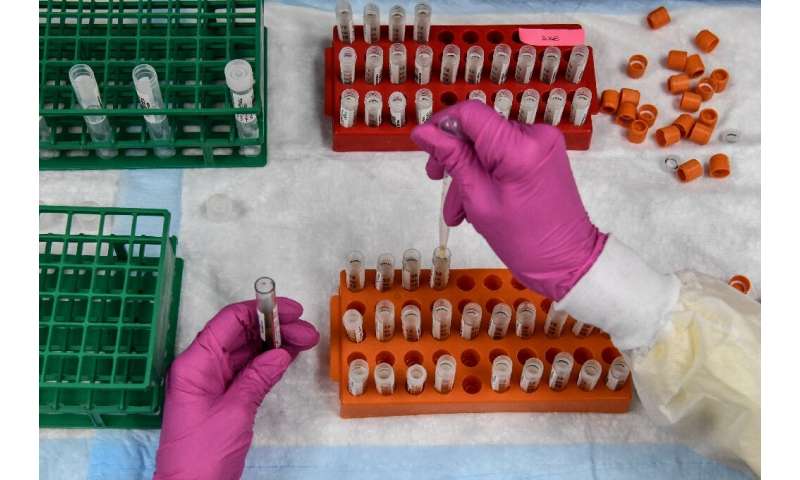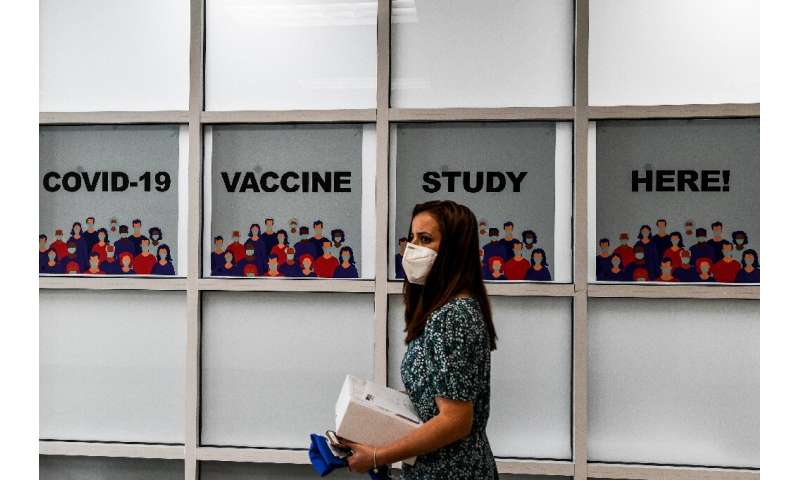
A COVID-19 vaccine by election day in the US? Experts worry that, facing an uphill battle for reelection, President Donald Trump could press for one to be approved before the November 3 vote, but also before tests prove it is effective and safe for the public.
– Where does vaccine testing stand?
Two producers, Pfizer and Moderna, began final phase-3 trials on July 27. Paul Mango, a senior official at the US Department of Health, said last week they so far have 15,000 volunteers out of 30,000 needed.
Pfizer’s vaccine requires two doses in 21 days, and Moderna’s two doses in 28 days. They use the same new technology, focusing on messenger RNA, which is promising but has never been proven in a vaccine.
In preliminary trials on dozens of test subjects, both vaccines provoked immune responses. But that alone does not prove they would protect against infection.
Another vaccine, under development by Oxford University and AstraZeneca, has already moved into Phase 3 testing in several countries, and just began trials in the United States.
– What would lead to approval?
In trials, half of the participants receive the vaccine and the other half receive a placebo. If the vaccine works, over time more of those receiving the placebo will naturally become infected with and sickened by the coronavirus, but fewer cases will appear among those receiving the real vaccine.
To get faster results, the vaccine developers are working in areas with high COVID-19 infection levels. CDC Director Robert Redfield has said that in order to know the vaccine is working, the placebo group needs to register 150-175 coronavirus infections, compared to just a few in the vaccine group.
– Who approves a vaccine?
In the United States, the Food and Drug Administration reviews the testing data and can give an emergency use approval to allow early release to the public.
Paul Offit, who is on the FDA vaccine advisory board, said independent experts on data and safety monitoring panels supervise the trials and review the results. They will have to determine whether and when the Phase 3 data are sufficiently clear to show the vaccines are safe and effective. Manufacturers will then be able to request emergency approval.
The final decision goes to FDA Commissioner Stephen Hahn. Based on his record of signing off on non-proven but Trump-favored but coronavirus treatments like hydroxychloroquine and convalescent plasma, some experts question Hahn’s ability to resist political pressure if the results from the vaccine trials are not clear-cut.
– The timeline

Most experts say that it is reasonable to expect the Phase 3 tests to be completed by year’s end.
Anthony Fauci, the country’s leading infectious disease expert, said Thursday that the initial results could come in “November or December.”
But it is clear the White House is aiming for earlier.
We “will produce a vaccine before the end of the year, or maybe even sooner,” Trump declared to supporters last week at the Republican National Convention.
Then the Centers for Disease Control and Prevention told states to “urgently” get vaccine distribution systems in place so as to be operational “by November 1, 2020.”
And the administration has pre-purchased hundreds of millions of vaccine dosages to get them out to the public as fast as possible.
Fauci, however, said that being ready in October, before the election, would be difficult.
“That’s unlikely, not impossible,” Fauci told CNN.
The worry is that, for emergency use approval, the bar for ruling a vaccine safe and effective is lower than that for normal full approvals.
“How can you justify a substandard or lesser review for something that would be injected in tens of millions, maybe hundreds of millions of Americans?” said Peter Hotez, a US health and vaccines expert at Baylor College of Medicine in Texas.
But Fauci insisted that the role of independent experts in the process ensures that the FDA will not take a decision based on politics.
“We can have some confidence … in what the FDA is saying,” Fauci said.
White House spokesperson Kayleigh McEnany denied any pressure to get the vaccine out before the election.
Source: Read Full Article
